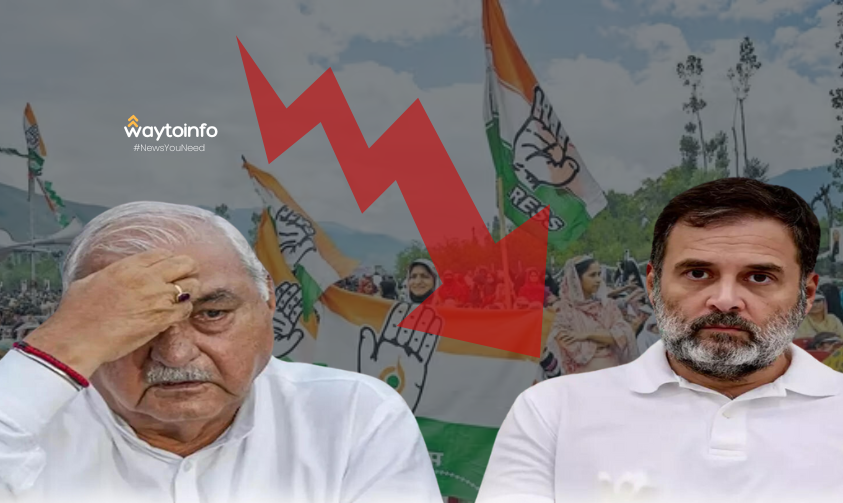
This Post thus establishes that the Congress party’s failure in the Haryana elections can be explained by the following factors which were manifesting some broader weaknesses in the party as well as process-specific factors in relation to the Haryana state. Understanding these reasons permitted us to define why Congress failed to get in touch with voters and lost to its political opponents.
1. Leadership Crisis and Internal Disputes
There is no doubt that one of the principal causes responsible for Congress’s failure in Haryana was the internal leadership problem. The state unit of the Congress, which has been suffering factionalism for years, failed to present a united face to contest the election. In this party, some senior leadership personnel were Bhupinder Singh Hooda, and Kumari Selja who sometimes used to prove each other thus creating an ambiguity about who would lead this campaign. This disunity watered down the part’s message proposition and its ability to influence the voters.
Similarly, Congress lacked an organized leadership who could have come out for the mobilization of the electorate base and galvanize the party workers on the ground level. On the other hand, the BJP under the presidency of Chief Minister Manohar Lal Khattar appeared to be a much more organized party.
2. Failure to Address Key Voter Concerns
The Congress party demonstrated a poor ability to traverse to the major issues of concern to the voters, or the issues impacting the rural parts of Haryana. While the BJP could present a narrative of development in the form of infrastructure and advantage of central schemes such as Pradhan Mantri Awas Yojana, the Congress failed to address the basic issues that convene voters such as unemployment, farmer issues, and demands for better social services systems.
Congress lost an impressive portion of the rural bump due to the verdict of Haryana, which has an agrarian economy that plays a part in deciding electoral outcomes the verdict of Haryana emphasized Congress’s failure to come up with a clear strategy to take on farmers’ distress. The AAP, in its entire manufacturing, promised numerous opportunities for economic reforms and the message of ‘development’ under the leadership of Narendra Modi.
3. Lack of a Strong Campaign Strategy
Yet one more factor that went against the Congress in Haryana was its campaigning. The BJP was also very aggressive in campaigning, employing old-school techniques like the distribution of pamphlets but also embracing the full power of the internet. The Congress had no cohesiveness nor did it have any major election campaign slogan or agenda. The other reason was that the BJP theme for their campaigns was the popularity of Prime Minister Narendra Modi and the issues of national security and thus excluded the message of Congress even more.
Congress also failed to adopt social media communication efficiently, and this has now become an important forum to address the young generation of voters. The BJP had much better methods of mobilization, especially over social media and micro-level communication strategies.
4. JBP’s Strategic Alliances and Strong Grassroots Network
However, certainly, not least, the considerable organizational abilities of the BJP in terms of its capacity to forge coalitions and construct a massive base of support contributed a lot to putting Congress out of the game. The party has invested years in developing a support base of most of the castes and regional leaders which has paid them a lot of dividends by garnering support on a large scale from different segments of the society. Whether it was the M Shiromani Akali Dal or Congress BJP targeting and weaning away the Jats from the traditional support base of the Congress party was critical to reducing its influence.
In addition, the BJP’s strong ground-level organizational structure helped them to better mobilize their voters on polling day, while Congress’s organizational machinery was weaker in comparison.
5. Modi Wave and National Issues Overshadowing Regional Concerns
Like in many other states, these elections were significantly affected by National politics and the ‘Modi wave’. India’s Prime Minister, Narendra Modi was well-liked, and ideas about the strength of nationalism under BJP leadership eclipsed most regional concerns. Congress failed to provide an effective competition to Modi and build a story around the same. Despite regional issues being an election agenda for the voters, the party was unable to leverage on the issue and the poll narrative was heavily pushed and tilted towards the BJPs advantage.
Thus, analyzing the Haryana experience needs to point to the problems of the lack of unity within the Congress party, leadership deficiency, and Congress’s inability to focus on issues that needed to be highlighted to woo voters and the wrong approach in the form and content of the campaign. The BJP superseded Congress and remained in power owing to better antecedent organizational structure, national marketing with Modi, and, above all, the party on the ground in Gujarat. It means that the Congress party and the government in particular must address these structural and strategic factors if it has to find a way back to winning the state and, for that matter, other states where it is struggling similarly.
Read Also A Critical Analysis of Why Exit Polls Failed in the 2024 Haryana Assembly Elections
Leave a Reply